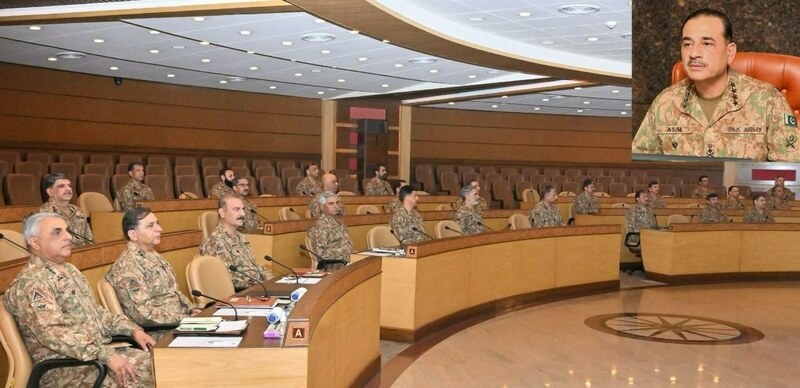Pakistan’s Commitment to Eliminating Terrorism and Enhancing National Security The recent 264th Corps Commanders’ Conference (CCC), presided over by General Syed Asim Munir, Chief of Army Staff (COAS), at the General Headquarters in Rawalpindi, has once again underscored Pakistan’s unwavering resolve to eliminate the scourge of terrorism from its soil.
The conference was not only a reflection of the military’s commitment to national security but also an affirmation of its role in the broader socio-economic stability of the country. The forum rightly paid homage to the supreme sacrifices made by the Shuhadas—heroes from the armed forces, law enforcement agencies, and civilians who have laid down their lives for the peace and stability of Pakistan.
These sacrifices form the bedrock of the nation’s resilience against threats both internal and external, reminding us of the price paid for the security we often take for granted. General Munir’s appreciation for the Pakistan Army and law enforcement agencies’ successful operations against terrorist activities is commendable.
Their proactive efforts have thwarted several attacks and neutralized key terrorist commanders, demonstrating a significant stride in counter-terrorism operations. The directive to deny any space to terrorists is a clear message: Pakistan will not tolerate any threat to its people and sovereignty. The condemnation of the terrorist attack against Chinese nationals in Besham and the killings in Balochistan highlights the external threats and internal challenges Pakistan faces.
It is crucial to recognize the regional dynamics, especially the adverse activities originating from Afghanistan, which not only threaten Pakistan but also pose risks to regional and global security. These activities undermine Pakistan’s economic interests, notably the China-Pakistan Economic Corridor (CPEC), a pivotal project for the nation’s future economic prosperity.
The conference also touched upon the ongoing aggression in Jammu and Kashmir, reaffirming Pakistan’s support for the Kashmiri struggle. This stance is consistent with Pakistan’s long-held policy of providing moral, political, and diplomatic support to the Kashmiris. Similarly, the expression of solidarity with the people of Palestine emphasizes Pakistan’s position on international justice and human rights.
Moreover, the commanders’ concern over the malicious propaganda campaigns aimed at demoralizing the armed forces is a serious issue. Such divisive tactics, designed to weaken the bond between the military and the populace, must be met with unity and legal measures to preserve the integrity of the state. The commitment to supporting the government’s initiatives for socio-economic growth, including combating illegal activities like smuggling and electricity theft, is a testament to the military’s broader role in national development. The emphasis on maintaining high standards of operational preparedness and professional excellence underscores the military’s role as a stable and progressive force within the country.
In conclusion, the outcomes of the CCC illustrate a comprehensive approach to national security, one that integrates military might with socio-economic initiatives. Pakistan’s path to stability is fraught with challenges, but with a concerted effort from the military and supporting civilian agencies, the nation can look towards a future where peace and prosperity prevail. This conference has not just been about setting directives but reaffirming a commitment to the nation—a safer, more prosperous Pakistan.







